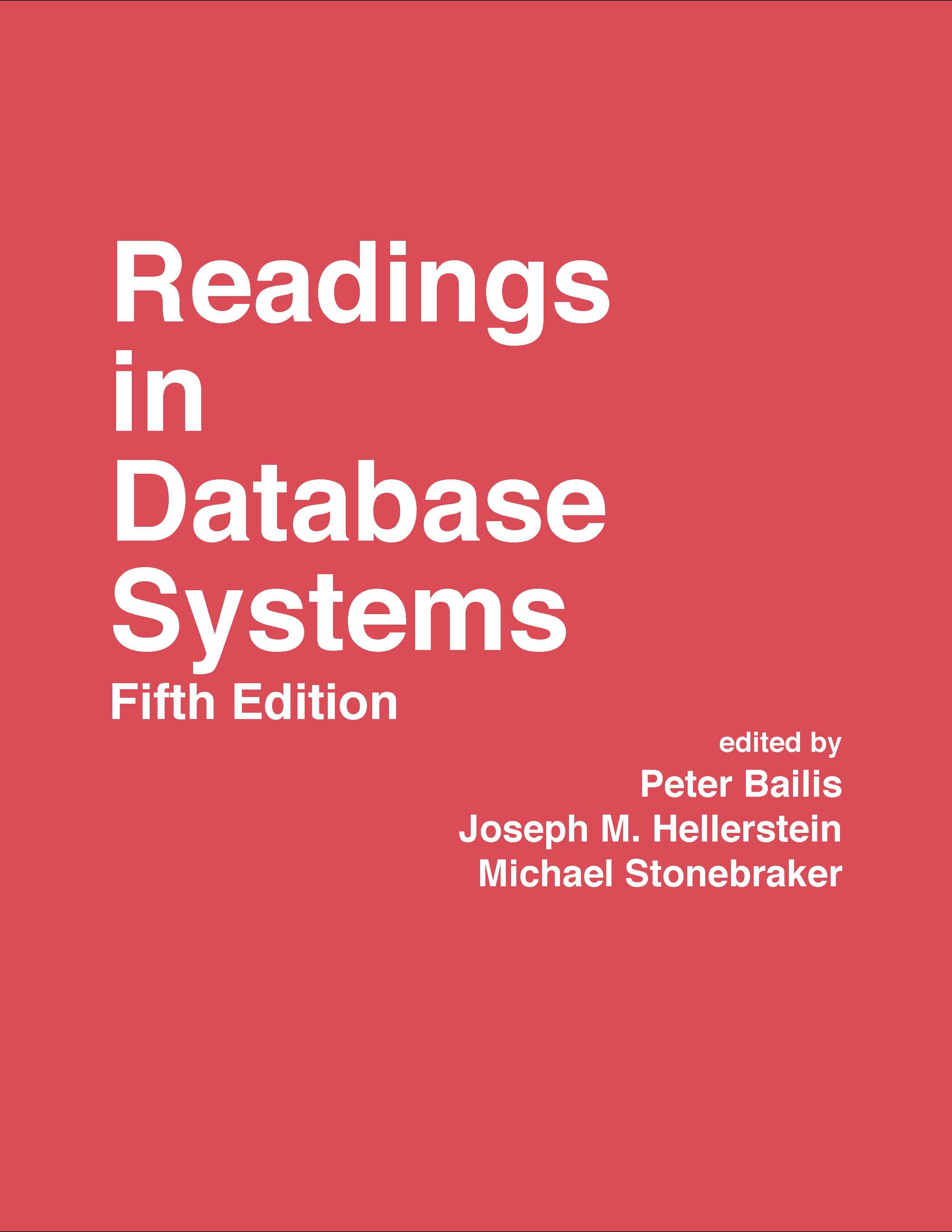
Readings in Database Systems, 5th Edition
This book offers readers an opinionated take on both classic and cutting-edge research in the field of data management, the first in over ten years since the 4th Edition.
Tag(s): Relational Database
Publication date: 31 Dec 2015
ISBN-10: n/a
ISBN-13: n/a
Paperback: 54 pages
Views: 12,755
Type: N/A
Publisher: n/a
License: Creative Commons Attribution-NonCommercial-ShareAlike 4.0 International
Post time: 29 Apr 2016 04:00:00
Readings in Database Systems, 5th Edition
 This book offers readers an opinionated take on both classic and cutting-edge research in the field of data management, the first in over ten years since the 4th Edition.
This book offers readers an opinionated take on both classic and cutting-edge research in the field of data management, the first in over ten years since the 4th Edition.
Publication date: 31 Dec 2015
ISBN-10: n/a
ISBN-13: n/a
Paperback: 54 pages
Views: 12,755
Document Type: N/A
Publisher: n/a
License: Creative Commons Attribution-NonCommercial-ShareAlike 4.0 International
Post time: 29 Apr 2016 04:00:00
Share — copy and redistribute the material in any medium or format
Adapt — remix, transform, and build upon the material
The licensor cannot revoke these freedoms as long as you follow the license terms.
Click here to read the full license.
Peter Bailis, Joseph M. Hellerstein, and Michael Stonebraker wrote:In the ten years since the previous edition of Readings in Database Systems, the field of data management has exploded. Database and data-intensive systems today operate over unprecedented volumes of data, fueled in large part by the rise of “Big Data” and massive decreases in the cost of storage and computation. Cloud computing and microarchitectural trends have made distribution and parallelism nearly ubiquitous concerns. Data is collected from an increasing variety of heterogeneous formats and sources in increasing volume, and utilized for an ever increasing range of tasks. As a result, commodity database systems have evolved considerably along several dimensions, from the use of new storage media and processor designs, up through query processing architectures, programming interfaces, and emerging application requirements in both transaction processing and analytics. It is an exciting time, with considerable churn in the marketplace and many new ideas from research.
In this time of rapid change, our update to the traditional “Red Book” is intended to provide both a grounding in the core concepts of the field as well as a commentary on selected trends. Some new technologies bear striking resemblance to predecessors of decades past, and we think it’s useful for our readers to be familiar with the primary sources. At the same time, technology trends are necessitating a re-evaluation of almost all dimensions of database systems, and many classic designs are in need of revision. Our goal in this collection is to surface important long-term lessons and foundational designs, and highlight the new ideas we believe are most novel and relevant.
Tweet
About The Author(s)
Peter Bailis leads the Stanford Future Data Systems research group. His research focuses on the design and implementation of next-generation data-intensive systems. His work spans large-scale data management, distributed protocol design, and architectures for high-volume complex decision support.

Peter Bailis leads the Stanford Future Data Systems research group. His research focuses on the design and implementation of next-generation data-intensive systems. His work spans large-scale data management, distributed protocol design, and architectures for high-volume complex decision support.
Joseph M. Hellerstein is Jim Gray Professor of Computer Science in the EECS Computer Science Division at UC Berkeley. His research focuses broadly on data-oriented systems and the way they drive computing.
Michael Stonebraker is Adjunct Professor at MIT. He has been a pioneer of data base research and technology for more than a quarter of a century. He was the main architect of the INGRES relational DBMS, the object-relational DBMS, POSTGRES, and the federated data system, Mariposa. All three prototypes were developed at the University of California at Berkeley where Stonebraker was a Professor of Computer Science for twenty five years. He is the founder of three successful Silicon Valley startups, whose objective was to commercialize these prototypes. In March 2015 it was announced he won the 2014 ACM Turing Award.

Michael Stonebraker is Adjunct Professor at MIT. He has been a pioneer of data base research and technology for more than a quarter of a century. He was the main architect of the INGRES relational DBMS, the object-relational DBMS, POSTGRES, and the federated data system, Mariposa. All three prototypes were developed at the University of California at Berkeley where Stonebraker was a Professor of Computer Science for twenty five years. He is the founder of three successful Silicon Valley startups, whose objective was to commercialize these prototypes. In March 2015 it was announced he won the 2014 ACM Turing Award.
